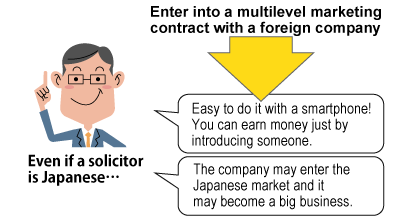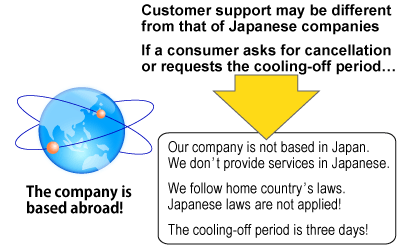Trouble with a foreign multilevel marketing company that claims no relation to Japanese laws - Company is based abroad!? I was told that I could earn money by introducing someone.
Thanks to the widespread use of smartphones and the Internet, it is easy for consumers to enter into a multilevel marketing1 contract with a foreign company. More and more consumers make a contract with a foreign company, encouraged by Japanese solicitors through SNS or triggered by online posts and videos.
Consumer centers across Japan have received many complaints from consumers who placed an order for service, etc. through the Internet without fully understanding contract details and risks, feeling at ease because a solicitor was Japanese, and then got in trouble when trying to cancel the contract with a foreign company. Under certain conditions, consumers who entered into a contract in Japan can request the cooling off period based on the Act on Specified Commercial Transactions, even if the contract was made with a foreign company. Quite a few foreign companies, however, would not accept such a request, insisting that they have nothing to do with Japanese laws.
It is concerned that similar problems may occur in the future. Therefore, NCAC decided to introduce recent cases of inquiries and issue an alert to consumers to prevent the occurrence and spread of similar problems.
- 1 Multilevel marketing transactions means transactions of goods or services by a sales organization sequentially expanded by soliciting a person to be a salesperson, and having the salesperson solicit another person to be a salesperson. The more purchasers, the more margin. Under certain conditions, multilevel marketing transactions are subject to control under the Act on Specified Commercial Transactions.
Flow of how consumers get in trouble when trying to cancel a multilevel marketing contract with a foreign company
Enter into a multilevel marketing contract with a foreign company

Customer support may be different from that of Japanese companies

If a consumer asks for cancellation or requests the cooling-off period...Hard to get a refund

Before making a contract, consumers were given a factually inaccurate explanation (e.g. "Anyone can do it with a smartphone", "You have to pay an initial cost, but you can earn more") or promising information without any substantial reason (e.g. "The business will be expanded in Japan"). Those consumers felt at ease when they were solicited in Japanese and a solicitor registered for them on a foreign language screen to enter into a contract.
If a contract partner is a foreign company, however, a consumer has to contact the foreign company in case of trouble. Negotiation with a foreign company may be difficult for consumers due to language barrier and lack of helpdesk in Japan.
Some foreign companies would only allow two or three days of cooling-off period or would not accept cancellation at all, insisting that their businesses are based abroad and are compliant with home country's laws.
Sampling of inquiries & complaints
- [Case1] I read a message on SNS "It's profitable", and I joined multilevel marketing transactions. No money has been earned.
- I read a message on SNS "I am a housewife and making profits", so I asked the person who posted the message how she earned money. She told that she made a contract with a foreign company and made profits. She sent me a URL for applying for registration and terms of use. She explained that it was necessary to create a website, which costed about 200,000 yen and that if I introduced the business to other persons, I could get a referral fee of tens of thousands yen per one person. She told that she would help me if there was any unclear point after registration. I was told to use a credit card for payment. I applied for registration on the website and paid about 220,000 yen with a credit card. I didn't receive a written contract. Instead I was told to check details on a video on a URL. When I contacted the company to ask unclear points in the system, I was just told to read the manual and did not get any technical support. I am at a loss how to handle it, so I want to cancel the contract. An online term sheet states that the cooling-off period is two days. The period passed, but I want to cancel.
- (received in April 2016, woman in her 20s in Ibaraki, homemaker)
- [Case2] I became a member of a travel club. Its initial fee is exempted if he/she introduces someone to the club. I cannot cancel the contract.
- I got acquainted with a self-proclaimed business person through SNS. The business person introduced me a foreign travel club, saying "If you join this travel club, you can travel at a lower price". I was also told "You will be charged an initial fee 50,000 yen and a monthly membership fee, but the initial fee is exempted if you introduce someone", and decided to register to the club. The business person entered my personal data for registration using his personal computer and I made a payment with a credit card, but I was not given any paper such as a copy of registration information and a contract. Later, I started to worry about the service and decided to cancel the contract. The website indicated that the cooling-off period of 14 days was allowed. The period did not pass, so I asked for withdrawal from the membership via email. Soon after, I received an English email stating that my email address was different from the registered email address, so it was unable to accept the request. It seems that the business person entered a wrong email address on the registration screen. I tried but cannot reach the business person. It's terrible if the monthly fee will be deducted from my credit card forever. I want to cancel the contract right away.
- (received in September 2016, man in his 20s in Shizuoka, salary earner)
- [Case3] A solicitor induced me to enter into an agent contract with a foreign website owner, telling that it would be profitable to get referral margins. Now I want to cancel the contract under the cooling-off rule.
- A friend of mine at school solicited me to do a network business by which anyone can earn money by introducing someone. According to the explanation, if I become an agent of a foreign website owner and a person whom I introduced earlier buys something on the website, a cashback will be given to the purchaser and a referral margin will be given to me. The margin will be paid once a week. My friend told that he had earned about 200,000 yen in total, and introduced me a senior member, who said "It is run by a global company, which will start business in Japan in the near future". I believed my friend and entered into an agent contract via the Internet and made a payment of about 300,000 yen with a credit card. I did not receive any paper such as a written contract. The company just sent me a PDF file simply showing that the contract was concluded. Later, my friend and the senior member said "it's getting dubious whether the company will do business in Japan". I am worried now. I want to cancel the agent contract under the cooling-off rule. A briefing document on the website, however, states "Unconditional cancellation will not be possible after three days passed". What should I do?
- (received in February 2017, man in his 20s in Hokuriku, student)
Characteristics and problems identified based on inquiries & complaints
Even if you ask for cancellation promptly, a foreign company may not accept your request or the cooling-off rule.
Multilevel marketing transactions may be subject to control under the Act on Specified Commercial Transactions.2
If a transaction is regulated under the Act, a consumer who entered into a contract in Japan with a company may be able to exercise the cooling-off 3 right under the Act, even if the company is based abroad.4
Some foreign companies, however, would only allow two or three days of cooling-off period or would not accept cancellation at all, insisting that their businesses are based abroad and are compliant with home country's laws (Case 1, 2, 3).
- 2 Article 33 of the Act on Specified Commercial Transactions states that multilevel marketing transactions having the following elements are subject to control: 1) the business of sale of articles or the provision of services in exchange for payment; 2) a counterparty is induced to invite somebody to be a member who sells the articles or the services, using the possible receipt of a specified profit; 3) members have to bear a specified burden (e.g. payment for goods, registration fee). Article 33-2 states that a solicitor shall clearly indicate the purpose of solicitation in advance.
- 3 Based on Article 40 of the Act on Specified Commercial Transactions, a consumer who entered into a multilevel marketing contract can cancel the contract in writing if it is within 20 days from the date of receipt of statutory documents (if the delivery of the good is afterwards, the date of delivery shall be the initial date of reckoning). Based on Article 40-2 of the Act, a consumer can demand cancellation of the contract in writing even after 20 days passed if the consumer did not request the cooling-off period because the consumer misapprehended due to misrepresentation by the multilevel marketing distributor, or because the consumer was overwhelmed due to intimidation by the multilevel marketing distributor.
- 4 Article 11 of the Act on General Rules for Application of Laws provides for special provisions for consumer contracts which states "if the consumer has manifested his/her intention to the business operator that a specific mandatory provision from within the law of the consumer's habitual residence should be applied, such mandatory provision shall also apply to the matters stipulated by the mandatory provision with regard to the formation and effect of the Consumer Contract".
Solicitors told as if it was easy to make a profit and gave an insufficient explanation.
Consumers who got in trouble were given a factually inaccurate explanation (e.g. "Anyone can do it with a smartphone", "You have to pay an initial cost, but you can earn more") or promising information without any substantial reason (e.g. "The business will be expanded in Japan") (Case 3).
If a consumer was given a false explanation and entered into a multilevel marketing contract based on misapprehension, the consumer may be able to demand cancellation of the contract under the Act on Specified Commercial Transactions, even if the contract was made with a foreign company.5 Companies which engage in multilevel marketing transactions are required to deliver statutory documents including a written contract to consumers. According to the inquiries received, however, quite a few consumers were not given any document and entered into a contract without fully understanding details, and then got in trouble.
In case of multilevel marketing transactions regulated by the Act on Specified Commercial Transactions, solicitors are also subject to control under the Act. A problematic solicitor in Japan may be held liable for violation of the Act, even if the solicitation was made for a contract with a foreign company.
- 5 Based on Article 40-3 of the Act on Specified Commercial Transactions, a consumer can cancel a contract if he/she entered into a contract based on misapprehension due to misrepresentation or intentional concealment of a fact by the coordinator or solicitor (against Article 34-1 of the Act) or based on misapprehension due to misrepresentation by the general multilevel marketing distributor (against Article 34-1 of the Act).
It is difficult to understand the actual services to be offered under the contract and a mechanism for making a profit.
Services offered under a multilevel marketing contract are ordered and delivered via the Internet. It is not easy for a consumer to judge actual conditions and quality of the services and to fully understand a mechanism for making a profit before entering into a contract. Some consumers found that the actual services were different from what was explained, and got in trouble (Case 1, 2, 3).
If a company makes an expense claim in the name of registration fee and delivers cash dividends rather than providing goods and services, the business might constitute a pyramid scheme.6 Consumers need to be careful.
- 6 Under the Act on Prevention of Pyramid Schemes, no person may launch or operate a Pyramid Scheme, become a member or solicit another to become a member of a Pyramid Scheme. A person who has, in the course of trade, solicited another to become a member of a Pyramid Scheme will be subjected to criminal punishment.
Sometimes there's no helpdesk in Japan, which makes negotiation difficult.
Consumers often feel at ease when they are solicited in Japanese and the solicitor registers for them on a foreign language screen to enter into a contract. If the contract was made with a foreign company, consumers have to contact the foreign company in case of trouble. Negotiation with a foreign company can be difficult for consumers due to language barrier and lack of helpdesk in Japan. In addition, some consumers were not given any help by a Japanese solicitor in case of trouble or were not able to contact a Japanese solicitor (Case 2).
Advice for consumers
Don't believe words like "It's easy to make a profit". Read documents to properly confirm contract details.
Don't easily enter into a contract when a solicitor emphasizes gains (e.g. referral fee for introducing a person) without explaining concrete details of the business or when a solicitor tells you that it's easy to earn money by posting on SNS and soliciting someone. Carefully read documents to confirm contract details in advance. If the main offerings appear to be cash dividends rather than goods or services, the business might constitute a pyramid scheme. Consumers need to be careful.
Confirm beforehand if the foreign company has a helpdesk and if customer support is provided in Japanese.
Before entering into a contract, read the company's terms and conditions, website, etc. to confirm the existence of customer support for Japanese consumers and helpdesk in Japan. Even if you were solicited in Japan, you may have to directly contact the foreign company in case of trouble. Therefore, customer support circumstances mean a lot to consumers.
Never give false information such as "It's surely profitable" while soliciting.
In case of multilevel marketing transactions regulated by the Act on Specified Commercial Transactions, solicitors are also subject to control under the Act. According to the inquiries, many consumers were solicited through voice call application or SNS in addition to the traditional face-to-face method. It is easy to widely solicit consumers via the Internet. However, if the solicitation was accompanied with false information like "It's surely profitable", the solicitor may be accused of illegality. Never give false information.
In case of trouble, consult your local consumer center.
In case of multilevel marketing transactions, it may be possible to use the cooling-off rule under the Act on Specified Commercial Transactions. If you feel uneasy or get in trouble, consult your local consumer center as soon as possible.
- * Consumer hotline: 188 (no prefix)
The three digit phone number, which is common nationwide, will connect consumers to a nearby consumer center established by a local government.
Request to the government
To Consumer Transaction Division, Consumer Affairs Agency
Consumer centers across Japan have received more and more inquiries and complaints from consumers who entered into a multilevel marketing contract with a foreign company after being solicited in Japan and got in trouble when trying to cancel the contract. These foreign companies insist that they have nothing to do with Japanese laws and do not accept the cooling-off rule under the Act on Specified Commercial Transactions. Therefore, it is very difficult to solve such disputes.
Based on these facts, NCAC requests the government to disseminate the Act on Specified Commercial Transactions among solicitors and others who work in Japan for such foreign companies. NCAC further requests the government to keep Japanese consumers informed of precautions about multilevel marketing transactions and how to cancel a contract under the cooling-off rule.
To Secretariat of the Consumer Commission, Cabinet Office
Consumer centers across Japan have received more and more inquiries and complaints from consumers who entered into a multilevel marketing contract with a foreign company after being solicited in Japan and got in trouble when trying to cancel the contract. These foreign companies insist that they have nothing to do with Japanese laws and do not accept the cooling-off rule under the Act on Specified Commercial Transactions. Therefore, it is very difficult to solve such disputes.
Based on these facts, NCAC requests the government to investigate these problems and deliberate proper measures to be taken for Japanese consumers, solicitors and others working for foreign multilevel marketing companies under the Act on Specified Commercial Transactions in order to prevent the occurrence of similar problems.
